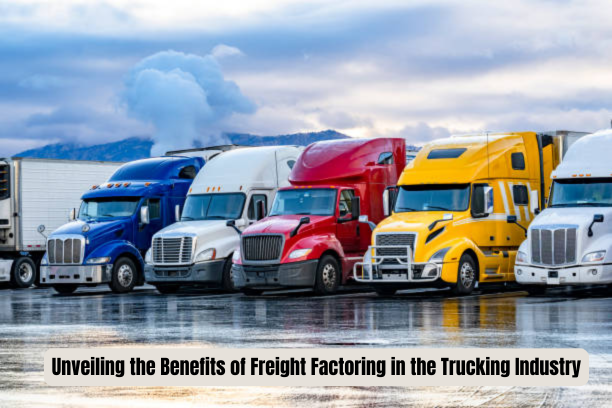Introduction to Freight Factoring
Freight factoring, typically called invoice factoring, is a critical financial device in the trucking enterprise. It’s designed to foster monetary balance and ensure operational fluidity for trucking agencies. It includes changing awesome invoices into immediate coins, a process that extensively aids in cash flow management. This transition is pivotal for trucking businesses, mainly considering the industry’s high operational prices.
By adopting factoring for trucking companies, agencies can bridge the economic gap between turning in freight and receiving payments, ensuring easy operations. Understanding this cornerstone concept may be necessary to preserve financial fitness and avoid commonplace cash drift pitfalls.
How Freight Factoring Works
Freight factoring operates on a sincere precept: it involves promoting your unpaid invoices to a factoring organization at a reduction. Here’s the way it works in practice. Once shipping is made and an invoice is generated, a trucking company can promote this invoice to a factoring business enterprise rather than expecting the client to pay.
The factoring organization then presents an improvement, commonly up to 90% of the bill price, within 24 to 48 hours. Trucking groups want this brief investment to pay running prices like fuel, renovation, and wages. The factoring organization releases the final finances after deducting a touch factoring fee from the customer’s charge of the invoice.
The rate may also range from 1% to 5% of the invoice amount, contingent on a number of variables, including the client’s creditworthiness and the number of invoices handled. This mechanism ensures spark-off cash waft and transfers the weight of amassing bills to the factoring enterprise. For a deeper insight into the mechanism, Truckers News affords a fantastic breakdown.
Advantages of Freight Factoring
- Improved Cash Flow: The maximum large gain of freight factoring is admission to instant coins. This liquidity allows trucking businesses to satisfy their daily prices without anticipating 30, 60, or even 90 days for bill bills. With more predictable coins floating, businesses can manipulate their price range more and plan for growth.
- Reduced Debt: Factoring no longer increases the debt load of a company enterprise,, unlike conventional loan facilities. Instead, it uses existing receivables to generate cash glide, making it an attractive choice for corporations looking to maintain a healthy balance sheet.
- Flexibility: Factoring is flexible, which is lovely if you look closely at the matter. Companies can select which invoices to factor in based on their cash flow wishes. Any company that wants to keep its balance sheet clean will find this type of arrangement simple.
- Easy Qualification: The strict qualifying criteria based on the creditworthiness of the company represent one main obstacle to conventional financing. Conversely, freight factoring relies on the creditworthiness of the trucking company’s clients. This allows financially struggling or modern companies to receive the required budget.
The Freight Waves internet site offers complete coverage of the advantages and capability drawbacks of freight factoring, making it a treasured resource for corporations considering this option.
Common Questions About Freight Factoring
Is freight factoring the same as a mortgage?
No, freight factoring is extraordinary from a loan. When factoring, you are not borrowing money but instead promoting your receivables at a reduction. This results in an instantaneous budget without adding to your monetary liabilities.
What are the charges related to freight factoring?
The number one price related to freight factoring is the factoring fee. Usually, this price is between one and five percent of the total invoice. The percentage depends on how creditworthy your clients are, how many invoices you factor in, and the terms you agree to with the company that does the factoring. There may also be additional expenses for services, including credit checks or collection offerings.
How long does it take to receive finances?
Most factoring groups offer funds within 24 to forty-eight hours of invoice submission. This brief turnaround time is one of the primary benefits of freight factoring, as it lets trucking groups maintain a constant cash flow to manage their operational costs effectively.
Choosing a Freight Factoring Company
Selecting the proper factoring enterprise ensures a successful and valuable partnership. Here are some key considerations to keep in mind:
- Fee Structure: Understand the charge structure thoroughly. Ensure there are no unstated expenses or other expenses that could impact your internet receivables. Compare the factoring costs throughout exceptional organizations to find the most competitive and transparent quotes.
- Contract Terms: Read the agreement terms cautiously. Some factoring businesses may have lengthy contracts with minimum month-to-month requirements, while others offer more flexible preparations. Choose a corporation that aligns with your business wishes and offers favorable terms.
- Reputation: Research the factoring business enterprise’s recognition. Look for critiques and tips from different trucking corporations. An employer with impressive recognition will likely offer dependable, efficient, and apparent services.
- Customer Service: Effective communication and assistance are vital. Ensure the factoring company provides extremely good customer support to immediately resolve any questions or problems. This will ensure an easy and problem-free factoring experience.
Final Thoughts
Freight factoring can be a game-changer for trucking agencies facing cash-waft challenges. Businesses may also meet operating costs, plan for enlargement, and preserve monetary stability by turning over fantastic invoices into immediate coins. Understanding how it works and its numerous benefits makes freight factoring a possible monetary device for trucking corporations.
Remember to pick a reputable and dependable factoring associate to ensure a smooth and beneficial revel, allowing your commercial enterprise to thrive inside the aggressive trucking industry.
Also Read:

